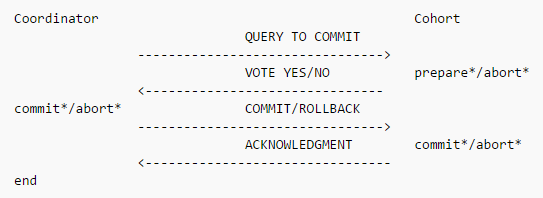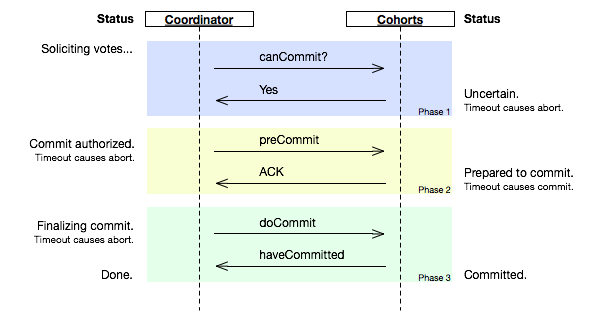分布式事务
March 21, 2017
Distributed System[TOC]
Introduction
(from Wikipedia)
A distributed transaction is a database transaction in which two or more network hosts are involved.
Usually, hosts provide transactional resources, while the transaction manager is responsible for creating and managing a global transaction that encompasses all operations against such resources.
Distributed transactions, as any other transactions, must have all four ACID (atomicity, consistency, isolation, durability) properties, where atomicity guarantees all-or-nothing outcomes for the unit of work (operations bundle).
distributed transactions = distributed commit + concurrency control
柔性事务满足 BASE 理论(基本可用,最终一致), 刚性事务满足 ACID 理论
Solution
2PC (XA、JTA/JTS)

Idea:
- tentative changes, later commit or undo (abort)
- single entity decides whether to commit —— Transaction Coordinator (TC)
But it has a bad reputation:
- slow because of multiple phases / message exchanges
- locks are held over the prepare/commit exchanges; blocks other transactions
- TC crash can cause indefinite blocking, with locks held
Conclusion: - Used in sharded DBs when a transaction uses data on multiple shards - Usually used only in a single small domain (E.g. not between banks, not between airlines, not over wide area)
3PC

Improvement:
- 3PC is non-blocking: it places an upper bound on the amount of time required before a transaction either commits or aborts. This property ensures that if a given transaction is attempting to commit via 3PC and holds some resource locks, it will release the locks after the timeout.
MQ (RabbitMQ, Kafka)
Idea: Decoupling, Eventually Consistency, broadcast, flow control,
Duplicated message, Sequence, Reliability
TCC (Try/Confirm/Cancel)
事务补偿型
Transactions for SOA